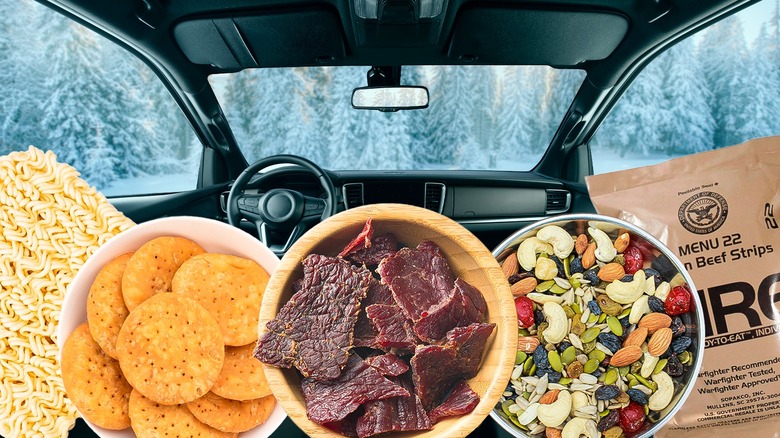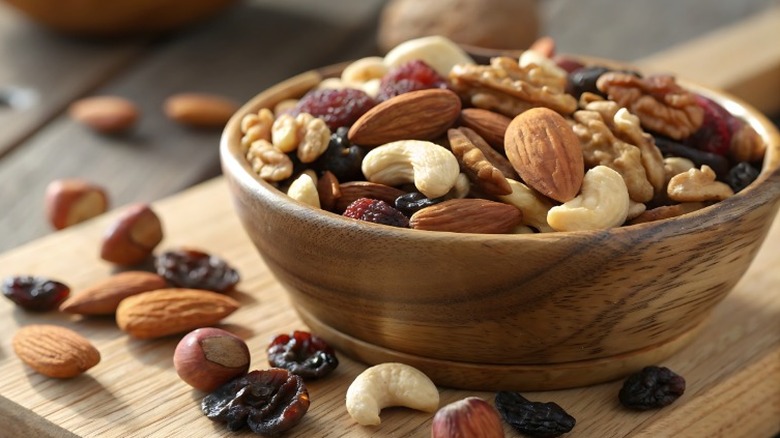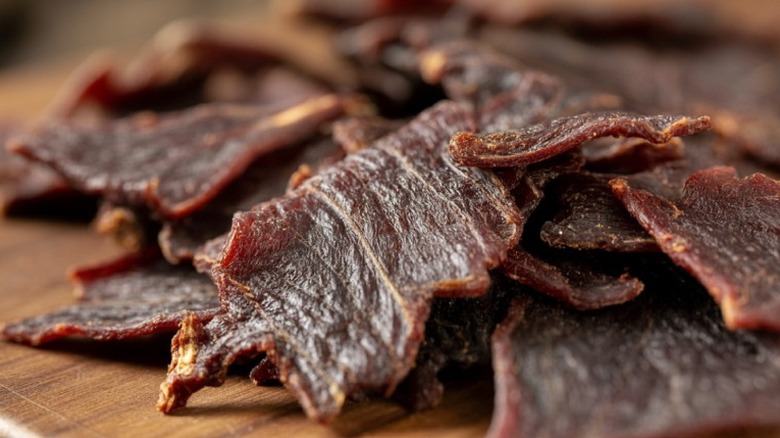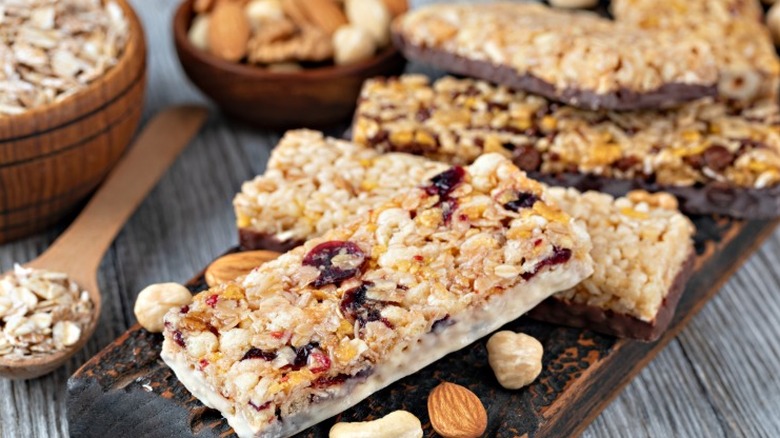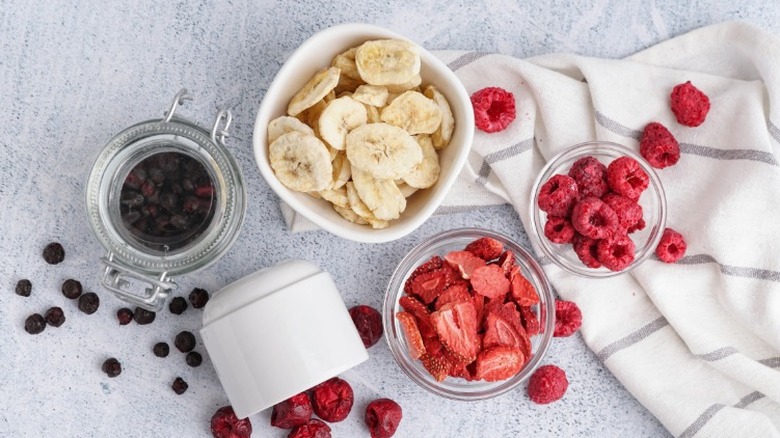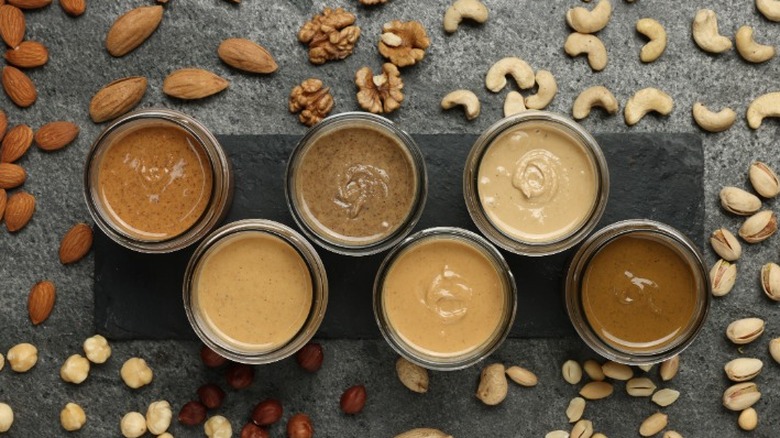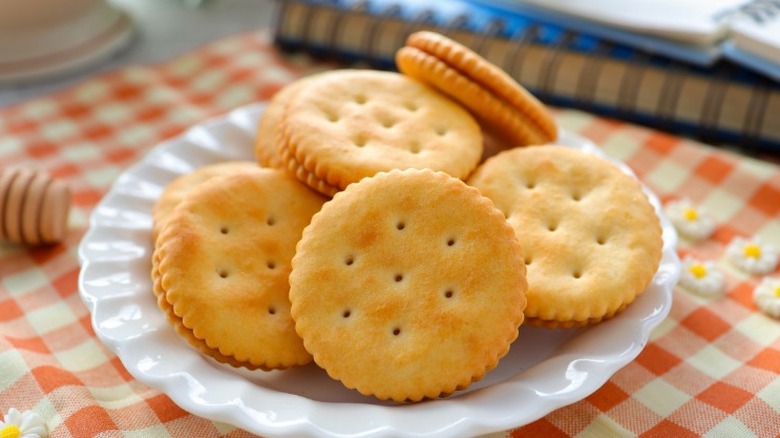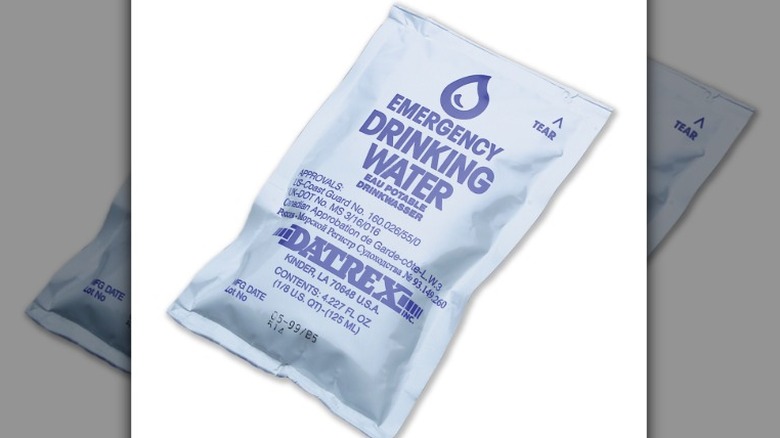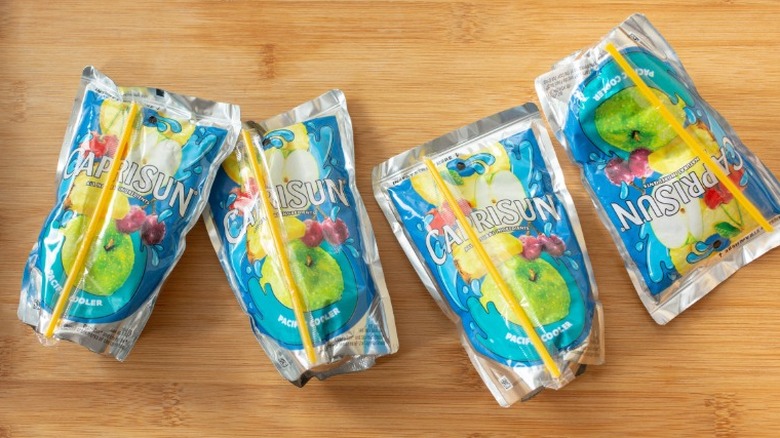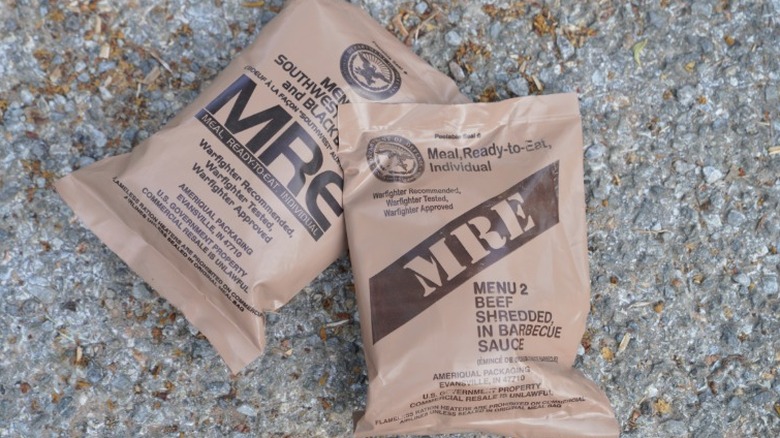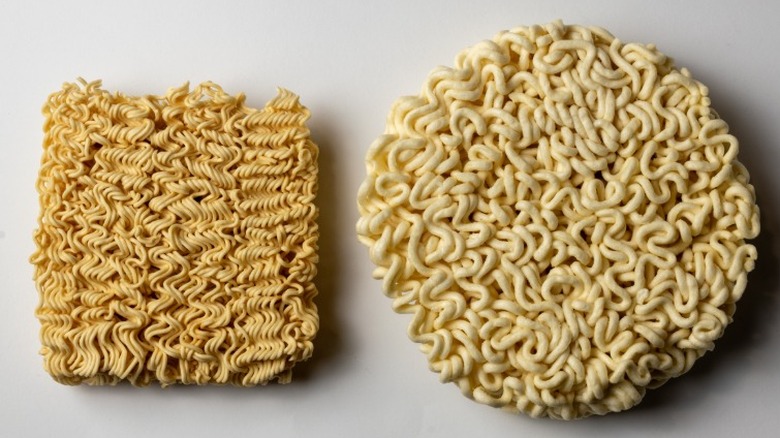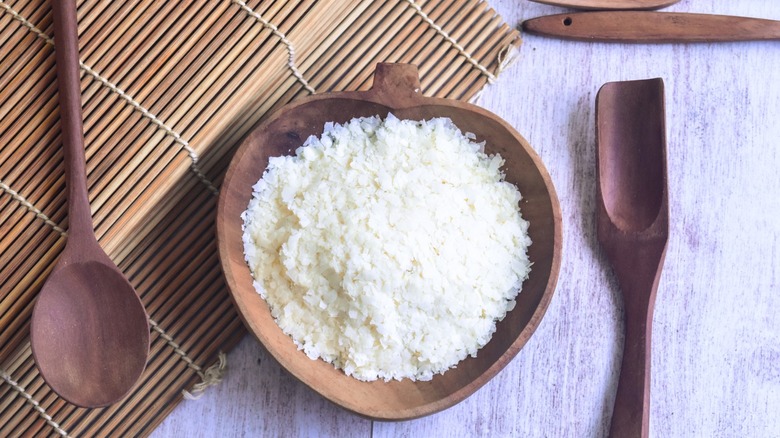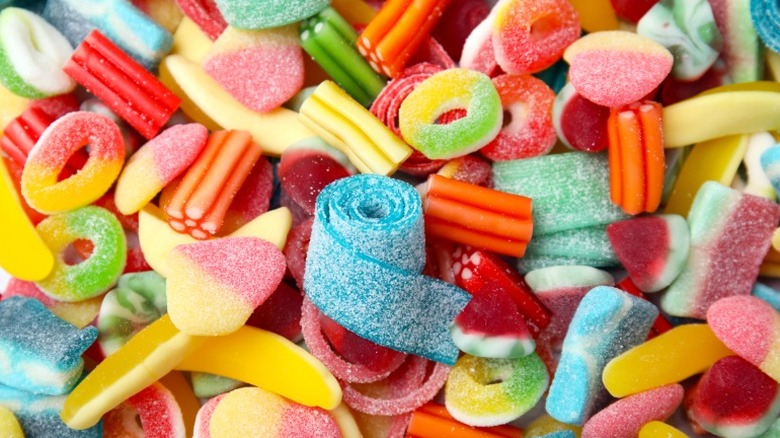13 Emergency Foods To Keep In Your Car When Winter Weather Hits
As the colder months approach, so does the chance for extreme winter weather. As of October 2025, the National Weather Service has already warned high-elevation areas in California, Nevada, and Washington of upcoming heavy snowfall. Depending on which part of the country you reside in, winter hazards can range from snow to severe ice storms and blizzards. If you find yourself caught in extreme weather, you should try to stay inside and focus on staying warm. When it comes to eating, you can prepare your pantry for a winter storm by stocking up on filling and long-lasting food items. If you have to travel for work, school, or family, however, you'll also want to prepare your car.
Every vehicle should be equipped with an emergency kit filled with first-aid supplies, useful tools, and non-perishables. Food gives your body energy while water and other liquids can stave off dehydration, especially in dry winter air. Not all foods are meant to withstand freezing temperatures, so it's important to know what is safe to keep on hand. Canned items, for example, can expand when frozen and potentially explode. Read on as you build out your emergency car kit to find out what foods can withstand the cold and keep you fed during a winter weather emergency.
Trail mix
On one hand, trail mix is a commonplace snack. You can find any number of assorted options in every grocery store, and it's a go-to for movie nights and game days. It's also a very good source of energy. Trail mix dates back as far as the 1800s, with earlier versions eaten by Native Americans long before. It quickly became popular among backpackers and others who needed convenient sources of energy. In one quick handful, you get a medley of carbs, fats, and proteins.
Trail mix is shelf-stable and doesn't need to be heated to eat, so it's a good option in a winter emergency. Nuts and dried fruits are nutrient-dense and provide a much-needed boost of energy in cold weather. When storing the mix in your vehicle, it can be kept in its original container or even vacuum-sealed to retain freshness. The best part is that there are endless customization options. Change up the type of nuts or fruits, add in some chocolate, and you won't get bored even if you have to eat it for a few days in a row.
Jerky
Since they are compact and ready to eat, dried foods are ideal to keep around for any emergency situation. One of the best options is jerky. These dried strips of meat are most commonly made from beef, but other lean meats like pork and venison are also used. The dehydrated meat contains little fat, meaning it's slower to spoil and can last in an airtight container in your car for longer periods of time. Jerky has long been considered a survival food for its longevity, portability, and health benefits.
Beef jerky, in particular, has a higher ratio of protein to calories than other survival foods. The healthy fats and sodium present in the strips are also essential when your body is in survival mode. Some store-bought brands can last for up to two years unopened, so this is one food item you can stash in the car for upcoming winter storms and not have to worry about for quite some time. You can even make homemade jerky without a dehydrator, though keep in mind it won't last as long as the commercial stuff.
Protein and granola bars
Whether you're a gym bro or college student rushing to an 8 a.m. class, you probably have some form of bar-shaped snack on you right now. Both protein and granola bars are convenient, portable snacks, though they serve slightly different purposes. The best protein bars are filling and provide muscle support. Granola bars have fiber and other vitamins and minerals that vary based on their ingredients. Whichever you prefer, in an emergency, it's a good idea to have some of each on hand.
When stocking up, there are a few considerations to keep in mind. Preferably, look for more nutrient-dense options and pay attention to the texture. Some soft protein bars can become difficult to chew in freezing temperatures. Backpackers on Reddit recommend Luna bars and crunchy-style varieties like Nature Valley to avoid biting into a snack that's as hard as a rock during the winter months. If you have access to milk powder, granola bars can also be crumbled and mixed with rehydrated milk for a makeshift bowl of cereal.
Freeze-dried fruits
Another snack you'll want to keep in your car when winter weather hits is freeze-dried fruit. While fresh fruit should never be stored in a vehicle for extended periods of time, the freeze-drying process draws moisture out of the fruit, meaning it can potentially last for years when stored in a cool, dry spot. While other methods can cause nutrient loss, freeze-drying ensures that the produce retains most of its health benefits. That means you'll still get the fruit's antioxidants and vitamins, just in a more portable form.
Unlike other similar foods, particularly emergency meals, freeze-dried fruit doesn't lose its original flavor. In fact, the fruit's natural sweetness can even become more concentrated. Some good options include freeze-dried strawberries, apples, and bananas. Of course, you can get creative and choose some less common fruits for more variety. Eat them straight from the bag or mix them with nuts to create your trail mix.
Nut butter
Though the country that eats the most peanut butter isn't the U.S., it is a wildly popular food among Americans. You'll find it in everything from sandwiches to candy bars. So, many of you will be happy to hear that, besides being delicious, peanut butter and other nut butters are also great survival foods. They pack a punch of energy and contain plenty of healthy fats and protein. Although quick energy may be your top concern in an emergency, it's always a good idea to have foods that provide long-lasting energy and other health benefits to keep your body going.
A jar of nut butter is easy to store in your car and can easily last a few months, depending on the type of product and the conditions inside the vehicle. Other options are small packets of nut butter or powdered peanut butter that can be rehydrated when ready to consume. If peanuts aren't for you, whether due to preference or allergies, there are varieties like almond and cashew butter with similar nutritional values. Even seed butter is available for those who need to avoid all nuts.
Crackers
Crackers are such a versatile food and yet so underrated. While lots of people consider them boring, they form the basis of many innovative dishes. You can use buttery round crackers to make a mock apple pie, for example, or fry saltines to upgrade your charcuterie board. Outside of these fun uses, they're also an effective survival food. Carbohydrates don't deteriorate as quickly as fats and proteins, so crackers will keep for longer periods.
Another added benefit of crackers is that, without added flavors, they are relatively plain and easy on the stomach, which helps both mentally and physically in an emergency situation. Some Reddit-recommended varieties include sourdough crackers and Sailor Boy Pilot Bread crackers. When stored correctly, both have impressive shelf lives and pair well with a variety of toppings. Of course, you can also buy different flavors if you plan to eat a lot and want to avoid monotony. If all you have on hand are Ritz or saltines, those will do just fine, too. You can use them as a bread replacement and combine them with a spread of nut butter to make a filling snack. Just make sure to have a drink on hand to wash it all down.
Emergency drinking water
Of course, in any emergency, the first thing you'll want to have is water. You can survive without food for weeks, but your body can only function for a few days without water. It is essential for kidney function, and without it, you'll start experiencing negative impacts on your health very quickly. Another side effect of dehydration is that it can make you feel more hungry, which is the last thing you need in a situation where food supply is potentially scarce.
Bottles of water seem like an obvious choice, but if you're taking that route, you'll want to make sure you have access to a heating source. In case of freezing temperatures, a portable stove and a small pot can be useful for melting frozen water bottles and cooking other foods. A better option, however, is emergency drinking water pouches. One of the top brands is Datrex, which has a shelf life of five years and can withstand extreme temperatures. Redditors detail that the pouches are durable and can be frozen and thawed repeatedly without leaking or quality changes.
Juice pouches
While water is an obvious necessity in any emergency, it doesn't always hold up well in blizzard conditions since it freezes at 32 degrees Fahrenheit. During a winter storm, temperatures can quickly go below freezing, and water, especially in plastic bottles, can solidify into an undrinkable block of ice. If water isn't accessible for whatever reason, it doesn't hurt to have another option on hand for quick hydration. Although not a replacement, juice can be a valuable alternative.
Juice contains sugar, which not only makes it a quick energy source, but also lowers its freezing point. The sugars inside the drink limit ice crystal formation, meaning they'll stay liquid longer than water. This is vital during extreme winter weather when you may not always have access to a heat source in your car. Juice pouches are ideal, as they tend to withstand freezing temperatures better than cans or plastic bottles. In fact, Capri Sun pouches are an option you may already have on hand that can withstand negative temperatures without fully freezing. It's a good thing Capri Sun isn't replacing its pouches anytime soon because you'll want to stock up on them.
MREs
If you're looking to build up your emergency kit, a good rule of thumb is to mimic what soldiers eat. These foods are almost always guaranteed to be long-lasting and nutrient-dense, specifically designed for survival situations. The MRE, or Meal, Ready-to-Eat, is one such food. MREs are individually packaged meals that can be eaten hot or cold. While they were created for the military, civilians can purchase them from numerous online retailers like Meal Kit Supply.
These are one of the most durable foods to keep in your car for emergencies. If you store MREs correctly, they can last up to 10 years, and compared with other foods on this list, they are the most nutritionally balanced. Each package is designed to be a full meal, with a dessert and drink included. In emergencies, MREs provide high levels of calories, protein, vitamins, and minerals that your body needs to function. Assuming you don't have access to a heat source in your car, they can be eaten cold, though they may not taste as good. Some also come with Flameless Ration Heaters, which, as the name suggests, heat the meal without the need for fire.
Honey
Perhaps the last thing on anyone's mind when it comes to their emergency food supply is a jar of honey. However, it is actually one of the best, most versatile survival foods out there. While you may not be able to subsist on the sweetener alone, it's a good source of antioxidants. The sugar content can also give you an energy boost and make a nice addition to crackers or other shelf-stable snacks in your emergency kit. But the benefits don't stop there. Though it's primarily a food item, honey has plenty of other uses. You've probably had some combination of honey and lemon as a sore throat remedy in your lifetime. Manuka honey has even been shown to help heal burns in pigs, and medical-grade honey is used to treat wounds.
And yes, honey actually does last forever. It's low-moisture and acidic, making it a difficult environment for bacteria to survive. As long as the jar is well-sealed, the product may crystallize, but it won't go bad. In fact, preserved pots of honey have been found in excavated Egyptian tombs. While you may not need to store it for thousands of years, rest assured, it will be safe and sound in your vehicle for as long as you need it. So next time you stir a spoonful into your cup of tea or yogurt bowl, stop to appreciate just how powerful nature's sweetener is.
Instant ramen
If you're a college student, instant ramen is probably the first thing that comes to mind when you think of survival foods. It's cheap, easy to make, and tastes good. The same qualities that make it appealing to a budgeting student make it perfect to keep in your car for emergencies. No, instant ramen doesn't have a ton of nutritional value. However, it does make for a simple meal that will keep you full longer than many other non-perishable foods.
If you're lucky enough to have access to heat, you can cook the ramen with hot water as usual. Since seasoning packets are included, you won't have to carry around extra spices or eat a bland bowl of noodles. But if you find yourself in a situation without a heat source, you can actually use the cold soak method to prepare your ramen. Just pour cold water over the dry noodles and wait for them to soften, usually around 20 to 30 minutes. While this is more time-consuming, it can be a lifesaver in a pinch. Worst case scenario, there's nothing wrong with eating the dry ramen straight from the package as a crunchy snack. In fact, some people even prefer them that way.
Instant potato flakes
When you think of mashed potatoes, you probably imagine the comforting, homemade variety your family serves up for Thanksgiving dinner, maybe with a pat of butter melting on top. However, don't be too quick to disregard the instant mashed potatoes you can find at the store. These humble little flakes can last anywhere from months to years, depending on their storage conditions. Their low moisture content makes them more resistant to bacterial growth.
Brands like Augason Farms make instant potato flakes with a shelf life of up to 10 years. But even the packs from your local grocery store will stay good for quite a while. To prepare them, you can use hot water if you have access, but cold or room-temperature water will also work to rehydrate the flakes. If you're in a position to cook more than usual, instant potatoes also make a great thickener for soups and stews. Though they might not be the stuff of dinner table legends, instant potatoes can be the key to weathering winter storms.
Candy
Your dentist may not be thrilled with this advice, but candy can be used as more than just an occasional treat. Most people wouldn't deem it essential or label it as a survival food, but candy does have its benefits in emergency situations. You won't get much nutritional value, but it can provide a quick boost of energy to keep your body pushing through the cold. There's also a motivational aspect to having a sweet treat. That little piece of candy might not seem like much, but it could be what you need to boost your morale under otherwise harsh conditions.
Choosing the right kind to store in your vehicle is important. You may gravitate toward your personal favorites, but some won't withstand the test of time. Hard candies can last around a year, depending on the variety, and Pixy Stix hold up well due to their powdered texture. Gummy candies may have a long shelf life, but they can become difficult to chew when they get too cold. Individually wrapped varieties are your best bet for maintaining freshness and avoiding a frozen mass of sugar. So if you're thinking of clearing out your candy stash, save a piece or two. You never know when they might come in handy.
